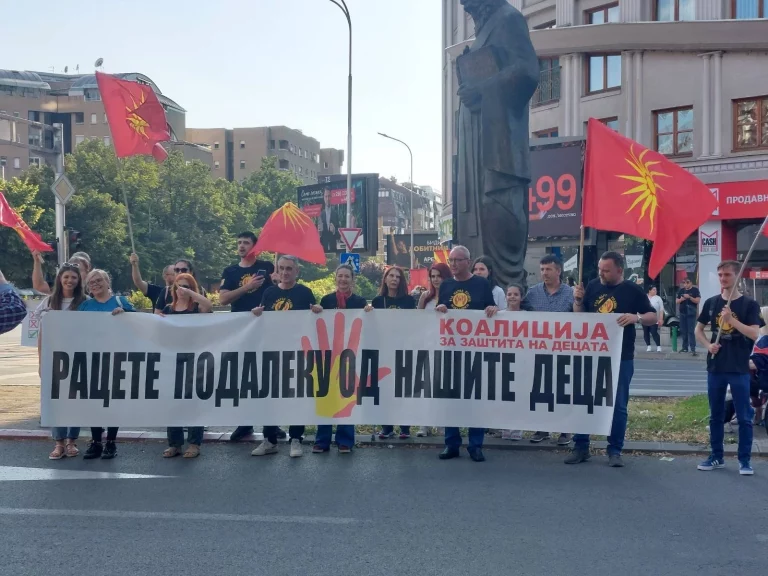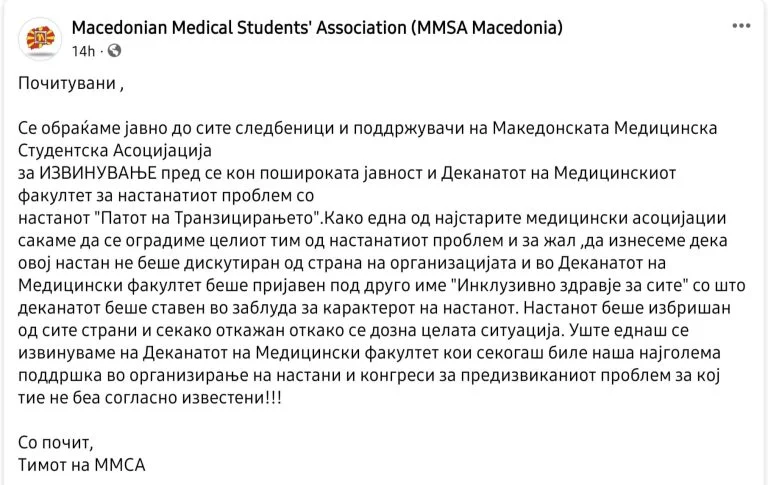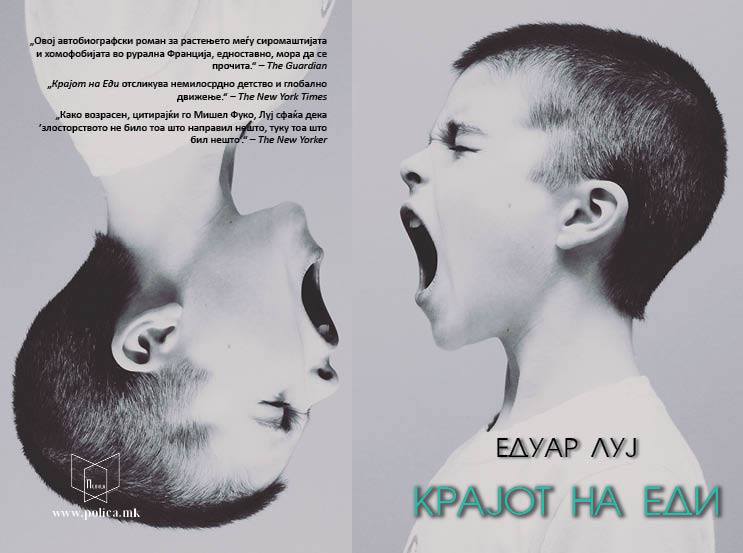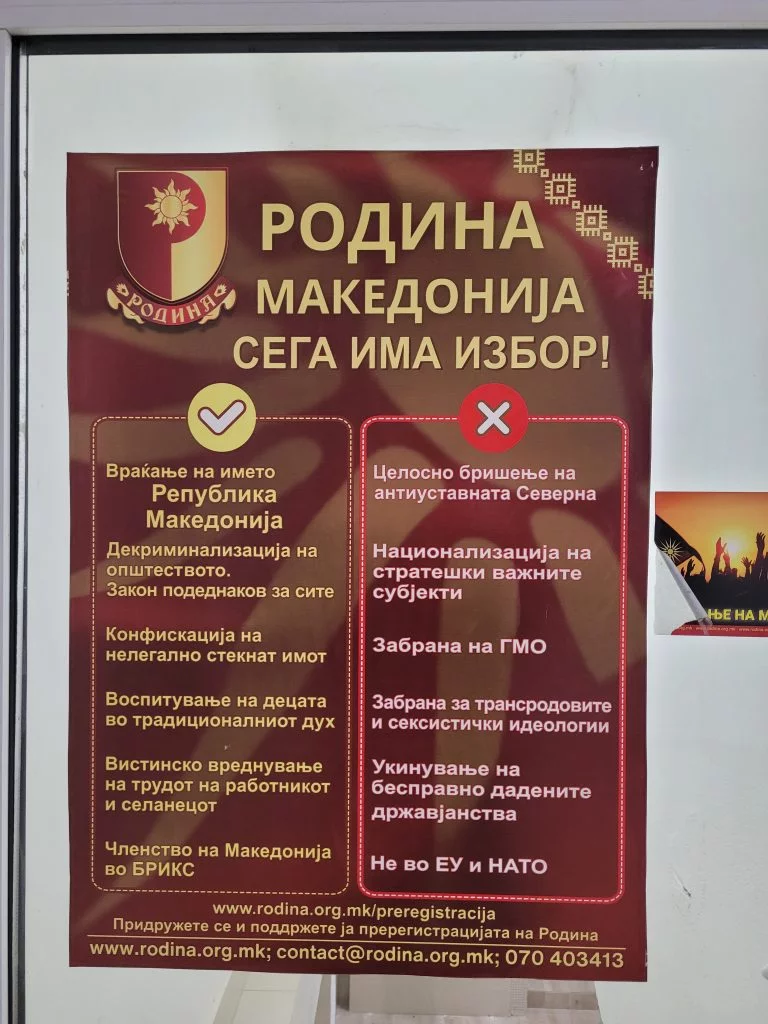WHEN MEDICAL STUDENTS APOLOGISE – THE IMPACT OF THE ANTI-GENDER MOVEMENT IN THE PUBLIC SPHERE
May 8, 2024
How the anti-gender movement, supported by American and Russian Christian organisations, incite fear and hatred in the public discourse under the pretense of defending “family values”
In April 2024, the Macedonian Medical Student Association (MMSA) announced on Facebook that the Faculty of Medicine of the Ss. Cyril and Methodius University (UKIM) in Skopje will host a lecture titled “The Path of Transitioning”. According to the post, the lecture was supposed to cover various aspects of gender-affirming care and medical services. The two speakers at the lecture were set to be a plastic surgeon and an activist who would share her experiences with gender-affirming care in North Macedonia.

“Keep your hands away from our children.” From the protest organized by the Macedonian Orthodox Church, protesting the new law on gender equality, and the amendments to the law for civil registration, 29 June 2024. Photo: Bojan Blazhevski / Meta.mk
However, the lecture never took place.
The lecture was cancelled after the group “Coalition for the Protection of Children” (KZD), whose relation to the Faculty of Medicine is unclear, publicly criticised the student organisation MMSA. KZD claimed that the Dean’s Office was notified of the lecture, but that the students said the lecture had a different name. KZD implied that student organisation was trying to “sneak in” the lecture. After this post, MMSA cancelled the event and publicly apologised several times to the Dean’s Office.

Screen-shot of MMSA’s apology. The screenshot was shared by the Coalition for the Protection of Children.
Coalition Margins, a local organisation that, among other things, fights for LGBTQ rights, responded by stressing the fact that gender affirming medical procedures are supported by decades worth of research and are not merely “experimental”.
“The decision to cancel the lecture was the result of the panic, hatred, manipulation and hysteria spread by several anti-democratic and discriminatory persons, groups and coalitions, known as the anti-gender movement,” say Coalition Margins in their response.
The anti-gender movement is the key to understanding how this fiasco could have occurred. The “Coalition for the Protection of Children” (KZD) is one of few accounts with a significant online presence on Facebook which is part of the so-called anti-gender movement. Representatives of this movement oppose “transgender” or “gender ideology”, as they believe that the normalisation of LGBTQ people in society is part of a Western conspiracy to destroy the family unit. Their posts are full of hate speech and are frequently directed to specific members of the LGBTQ community.
A cursory browse through KZD or other similar pages like “From Us for Us” or “Take Responsibility” immediately reveals a few facts.
First, the pages sharing inflammatory content are not just a few isolated personal accounts that are merely expressing their opinions. Rather, there is a network of many Facebook profiles with thousands of followers.
Second, there is a staggeringly large volume of fairly well-written content posted every day, which does not look like the work of amateurs. The posts are even frequently accompanied by sources. All of which is to say that behind these profiles is not merely a “concerned group of parents”, as these pages often present themselves, but some larger structure.
In fact, the anti-gender movement is an international phenomenon backed by American organisations, supported by Russian and American Christian oligarchs, for the purpose of spreading traditional values worldwide, from Uganda to Hungary.
It is exactly this structure that enables associations like KZD to mobilise quickly and have influence beyond their online space. Their influence can be seen in the cancellation of MMSA’s lecture, as well as the protests organised by the Macedonian Orthodox Church against the draft laws on gender equality and civil registration (which would expedite bureaucratic process for transgender people), and most generally in the adoption of their rhetoric by political parties.
The anti-gender movement’s methods and rhetoric (in North Macedonia and beyond)
The rhetoric of the anti-gender movement, in North Macedonia or otherwise, is essentially the same.
“The anti-gender movement uses disinformation and fearmongering and promotes intolerance, especially through social media, but also through local action and mobilisation,” says Sara Milenkovska, a feminist researcher and co-founder of the Stella Network.
Not only do the anti-gender Facebook pages share “imported” disinformation narratives, but they also produce local ones – a perfect example of this is the controversy stirred up around the novel The End of Eddy by the French author Édouard Louis. The novel was translated into Macedonian last and published by the publishing house ’Polica’.

The End of Eddy by Edouard, published by Polica. Photo: Polica
The novel portrays the experiences of a gay child whose life is full of sexual trauma. The anti-gender Facebook pages claimed that Polica was marketing the book to children; their evidence for this claim was the fact that the book’s cover had a photo of a child. As a result, KZD claimed that Polica “promoted” such traumatic experience as being normal for children. Polica publicly refuted this claim, or that they intended to sell the book to children in any manner. But Polica’s statement did not stop an avalanche of negative messages and allegations that they intend to “corrupt our children”.
This example illustrated one of the anti-gender movement’s favorite strategies – fearmongering by using the idea of an innocent child “destroyed” by those who hate the family and Christian values.
Apart from fearmongering, Milenkovska emphasises that the anti-gender movement often hides behind anonymity, save for a few public faces. One of those faces in North Macedonia is the famous anti-vaxxer Gordana Godjo. Through the group “From Us for Us”, she spread disinformation about comprehensive sexual education and advocated against vaccination during the pandemic, firmly planting the anti-gender movement on the side of disinformation.
“The ideology of anti-democratic movements, as demonstrated by anti-gender and anti-feminist actors, aims at creating resistance against progress, equality, human rights and dignity,” says feminist researcher Milenkovska.
The organisations behind the local anti-gender movement
A question then emerges: who exactly is funding and supporting these alleged protectors of children? If you look at KZD’s website, you will find a list of partner organisations. All of the aforementioned Facebook pages such as “Take Responsibility” and “From Us for Us” are all there, but so is Family Watch International, described as a “key partner”.
Family Watch International (FWI) is an American conservative lobbying organisation established in 1999 which promotes pro-family, traditional, anti-LGBTQ values worldwide. It was founded by Sharon Slater, the daughter of Howard Raff, well-known businessman and author.
Family Watch International is known for its work in Africa and is often accused of advocating anti-LGBT policies on the continent. Slater has even had a meeting with one of Uganda’s presidents. Uganda was recently in the news because it had passed one of the most vicious anti-LGBTQ laws of the century. It included life sentences and capital punishment for homosexuals in certain cases. Family Watch International denies it has supported any efforts in Africa to promote anti-homosexual bills and says it is opposed to the Uganda Anti-Homosexuality Act 2023.
It probably should not come as a surprise that FWI and their partner-organisations are funded by conservative Christian groups.
FWI is linked to the Church of Jesus Christ of Latter-day Saints. More commonly known as the Mormon Church, it is known for its adherence to traditional values. Although Family Watch International denies any connection with the Mormon Church, according to a research paper by the international organisation Ipas, the link is obvious if one looks at the history of the “parent” organisation of Family Watch International and the main donors, who are primarily Mormon organisations and wealthy members of the church.
Additionally, FWI is supported by a conservative advocacy umbrella organisation, World Congress of Families, also known as the International Organization for the Family. It influenced the adoption of the comprehensive homophobic 2013 law in Russia, which bans public presentation of any LGBTQ-related content. Conservative Americans and Russians established the organisation and it receives donations from Russian oligarchs who also support initiatives of the Russian Orthodox Church.
Roots of the anti-gender movement
It is important to note that all the funding in the world could not support dissemination of “pro-family” propaganda if societal and material conditions were not such so that people are ready to internalise said propaganda. Namely, according to the United Nations Research Institute for Social Development, the anti-gender movement found fertile ground in people’s anxiety after the financial crisis in 2008.
“More recently, anti-genderism has been attributed to the rise of new illiberal populist right-wing movements that have emerged after the 2008 global economic recession. Feeding upon ‘anxieties produced by neoliberal reforms,’ anti-gender ideology demonises gender equality, gender and sexuality diversity, and sexual rights movements as the cause of unwanted economic and social change, positioning a return to heteropatriarchy as a “common sense” solution that will restore order and certainty,” states the research paper led by Haley McEwen and Lata Narayanaswamy.
“The notion that economic and national crises can be ‘solved’ through a closing down of gender mainstreaming and LGBTIQ+ rights has become a platform for organising and for recruiting massive support amongst right-wing activists from otherwise distant walks of life, including believers and nonbelievers, nationalists, and universalists, populists who demonise global capital and traditional Reagan/Thatcher-style conservatives with a neocon love for the market,” state McEwen and Narayanaswamy.
“The anti-gender movement is an opportunistic illness that capitalises from the political and economic insecurity in vulnerable societies. Their policy aims to create resistance against progress, equality, human rights, and dignity”, says Sara Milenkovska.
The anti-gender movement almost always sees the West (acting as a kind of surrogate of all progressive ideas) as the ultimate enemy that aims to erode traditions. North Macedonia, where a large proportion of the population is disillusioned by the European Union accession process and the seemingly endless obstacles on the path towards the Union, is especially susceptible to anti-Western rhetoric.
How anti-gender influences – and will influence – Macedonia
North Macedonia has already witnessed how anti-gender rhetoric is employed by Eurosceptic and conservative political actors. In addition, such actors are often supporters of authoritarian regimes, such as for Putin’s Russia.
For example, the party “Rodina Makedonija” stands firmly “against sexist and transgender ideology”. Rodina, along with the parties Integra and MAAK can be found on the list of partners on the website of the Coalition for the Protection of Children.

Poster of the party Rodina Makedonija. Photo: Meta.mk
Anti-gender rhetoric is already present in mainstream parties, as can be seen by the statements of VMRO-DPMNE’s lead candidate in the fourth electoral unit Aleksandar Nikoloski. During the campaign for the upcoming parliamentary elections, he stated that his party believes only in a “mother” and a “father”, not in “parent 1” and “parent 2” – a statement that seems to borrow directly from the “Coalition for the Protection of Children” playbook. In fact, this is an old disinformation narrative that the terms Parent 1 and Parent 2 will be used in the pilot-curriculum for sexual education.
The anti-gender movement has also successfully brought together all sorts of conservative spheres from the conservative world – even the Macedonian Orthodox Church (MOC) came out with a public statement and a clear political position against the laws on gender equality and civil registration.
In the summer of 2023, MOC organised and promoted the protests against said laws, claiming that they were sent to the Parliament in a fast-track procedure. That turned out to be untrue – the Law on Gender Equality is still “stuck” in the Ministry of Labour and Social Policy, while the amendments to the Law on Civil Registration were read in the Parliament in a regular procedure.

From the protest organised by the MOC against the amendments of the Law on Gender Equality, 29 June 2024 | Photo: Bojan Blazevski, Meta.mk
Jakov Stobiski, the person behind MOC’s political activism, regularly spreads disinformation on the topic, alongside other popular global conspiracy theories. For example, he has talked about the “incredible connection between the progression of gender ideology and the liberalisation of pedophilia on a global level”. One should not be surprised that his article on the topic can be found on KZD’s website.
The danger and the future of the anti-gender movement
Anti-gender rhetoric and “activism” can only cause additional difficulties in the lives of transgender people; they will certainly not lead to the “protection of children”.
Research shows that there is a correlation between US states passing laws limiting transgender rights and increased violence towards trans children. Most alarmingly, this correlation exists even when such laws are merely read in local councils.
The rollback of transgender rights is just one piece of the puzzle of the consequences of these movements. They allow the validity of the progress of the rights of women and sexual minorities to be brought back on the table again. For example, KZD regularly shares disinformation in relations to abortion.
This regression in values caused by the anti-gender movement can be easily seen in the case of a gymnasium in Strumica that introduced a restrictive dress code which banned shorts, leggings and long fingernails. This policy came only a few days after a similar policy was implemented in Prilep. It is no coincidence that such rules were enforced in Strumica, the city that became a hot spot of the anti-gender movement, after “Parents’ Front” organised a protest in the town against the implementation of “gender ideology” in schools.
According to Lila Milikj, the transgender activist who was supposed to talk about her experience with trans medical care in the lecture cancelled at the Faculty of Medicine, the anti-gender movement has led to less space for trans lives to be publicly discussed.
“What the ‘Coalition for the Protection of Children’ did, hurt me personally. The cancellation of the lecture affected me since my right to explain my transition process was taken away from me. It was direct interference in the students’ learning process – students who one day will be doctors. The students were deprived of dialogue and insight into the problems and needs of trans people going through gender affirming medical care. It seems that the dean, or the student organisation under pressure, can cancel other events opposed by the anti-gender movement. The mere cancellation is a sign of high-level discrimination and stigma towards transgender people by institutions,” said Milikj.
Researcher Milenkovska agrees that dialogue remains the last resort for overcoming the damage and the pain caused by the anti-gender movement.
“I honestly believe that we should create space for dialogue, errors, but also for learning. That said however, it is still not clear how to initiate dialogue with a people who believe that queer and transgender people should not exist or that reproductive freedom should not be a right. How can one create a space for understanding if that person is not interested in your side of the story – especially the lives of marginalised groups. Nevertheless, we should address those who lack support and solidarity and create coalitions of care instead of coalitions of fear and violence,” concludes Milenkovska.
Author: Borjan Gagovski
This article was originally produced for and published by Meta.Mk. It has been re-published here with permission.
